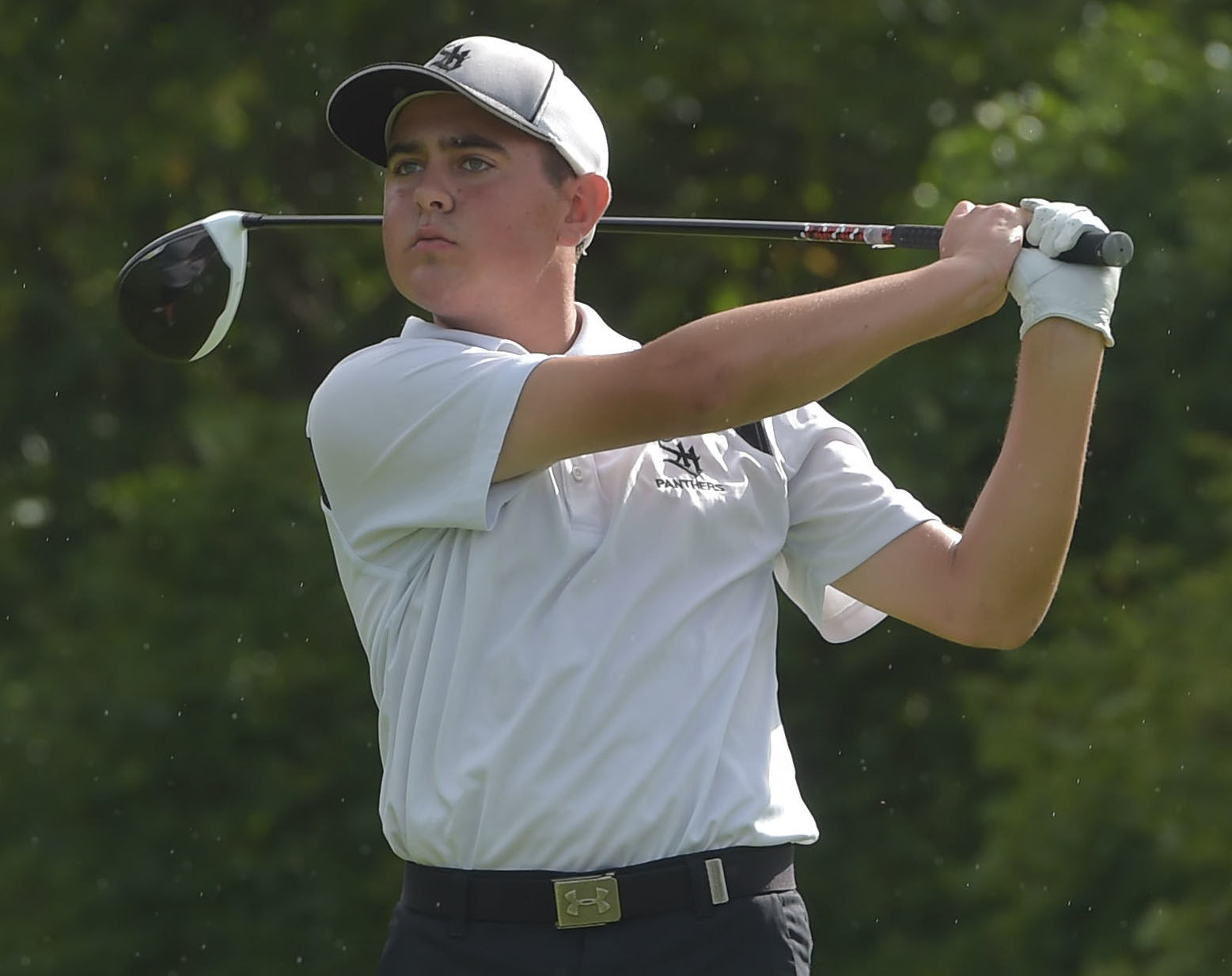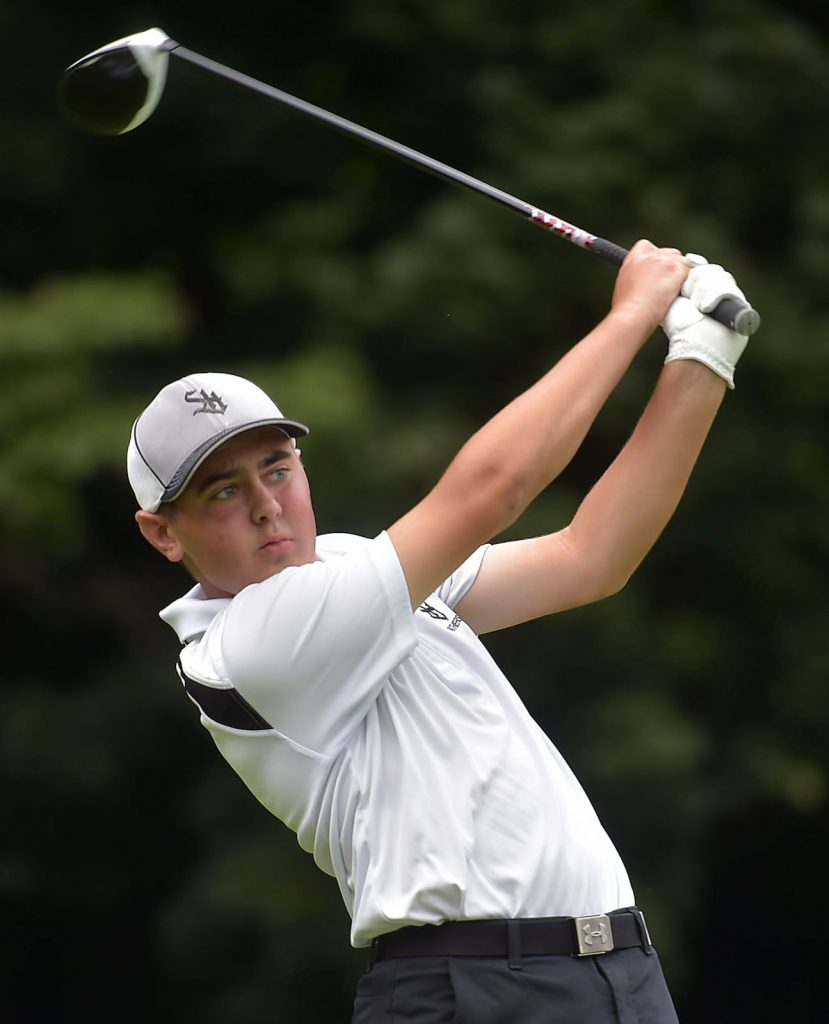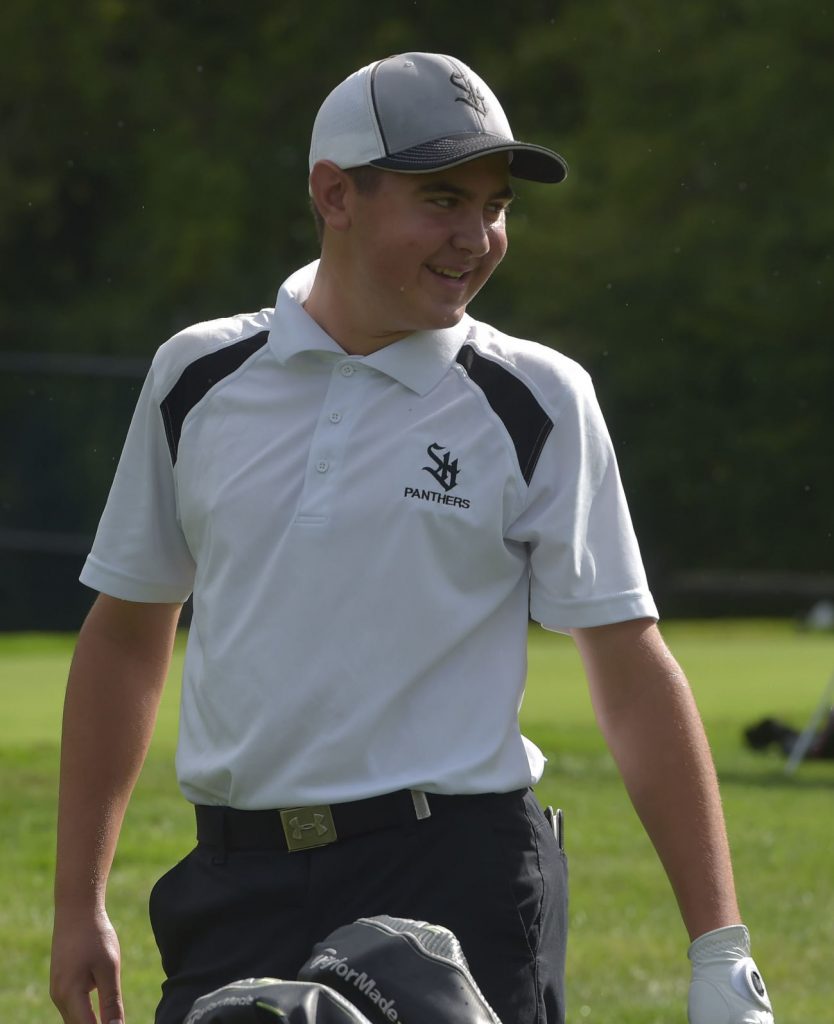
In recovery from heart ailment, golf course is Debusschere’s ‘happy place’
NETHER PROVIDENCE — The first hole at The Springhaven Club measures 408 yards, one of the course’s longer par-4s. But it’s nothing to Jackson Debusschere, not compared to what 10 yards used to mean.
That was the daily goal two years ago as an eighth grader. What started as a suspected cold spiraled into much more in November 2016. Within a week of feeling under the weather, Debusschere was on life support at the cardiac ICU at Children’s Hospital of Pennsylvania, suffering from giant cell myocarditis, an autoimmune attack of his heart muscle that requires a heart transplant in 90 percent of cases.
When Debusschere beat the initial odds, of his heart improbably returning to health after weeks in the hospital, he was faced with the task of learning many physical tasks anew: How to feed himself, how to walk, the latter starting 10 yards at a time in the family’s driveway.

And through it all, there was an unlikely savior: Golf, a sport Debusschere had played only recreationally before his illness, subordinating the game to his main sports, hockey and soccer.
But cooped up at home for five months of convalescence, needing something to pass the time, he turned to the links. And it’s a decision that has paid countless dividends.
“When I picked up a golf club, I couldn’t put it down,” Debusschere said. “I really enjoyed it. And considering it was the only sport I could play, I really wanted to do something with it, because I’m a really competitive kid. I can’t go without sports in my life.”
“Playing golf has become his happy place,” Jackson’s mom, Kira said.
Jackson is spreading the happiness around. The sophomore is a leader on Strath Haven’s 8-0 squad, the latest installment a 201-223 win over Ridley Wednesday. The passion he’s found on the golf course is more than just a hobby. It’s become the new normal for he and his family.
•••
The Debusscheres’ world, as Kira says, “turned upside down in a couple of hours” on Nov. 15, 2016. Two weeks earlier, Jackson had been a happy and healthy 13-year-old, playing with for Philadelphia Union’s academy at a tournament in North Carolina. (Kira, nee Dirago, played soccer at Strath Haven in the early 1990s; her husband, Dave, is the Union’s longtime Chief Operating Officer.)
A case of the sniffles quickly ballooned into full-body fatigue and shortness of breath. Sunday morning, Dave and Kira took Jackson to an urgent care center where he was misdiagnosed with pneumonia. By Monday morning, Jackson’s body was failing, and he was put on life support to save what little energy remained in his heart and lungs.
The diagnosis was grim: Giant cell myocarditis, in which the body’s immune system is hijacked to attack the heart muscle. The disease is so rare that CHOP told the Debusscheres that Jackson’s was only the third case it had treated. In 90 percent of cases, the immune response does so much damage that the heart is no longer viable and a replacement must be transplanted.
After two weeks, the upper limit of how long Jackson could withstand life support, the machines were removed. Jackson’s heart would have to beat on its own.
“And it did,” Dave said.

An arduous rehab was ahead, though a young body with Jackson’s reserve of cardiovascular fitness stood a better chance. But in addition to relearning basic functions via physical and occupational therapy, his course of treatment, a constant and initially aggressive dampening of Jackson’s immune system, left him unable to attend school for five months.
With hours to fill and low-impact exercise to get, Jackson turned to golf.
“I would say it was a big part of his therapeutic recovery, emotionally, mentally and physically,” Kira said.
“From the mental side of being able to take his mind off of everything, to allowing him to channel his competitive energy and allow him to focus on something he enjoys and take him mind off everything,” Dave added. “Plus the physical part of it, coming out here, walking, getting stronger in a way that wasn’t hard on his heart, that was a key.”
Golf wasn’t the heavy training Jackson was used to, but his heart could no longer take that aerobic pounding. First the driving range, then lugging a bag over 18 holes was a suitable replacement. Without lessons or training, he carded a round in the 80s with Dave, a sign he might be OK at this.
He fell in love from there.
“It was awesome,” he said. “Every day, without sitting at home, instead I went to the golf course, practiced, got better. Now it’s my main thing.”
The path wasn’t entirely clear of obstacles. Jackson entered junior tournaments the summer before ninth grade and set his sights on trying out for varsity in the fall. But things got complicated. He had follow-up surgery in July 2017, which uncovered vascular damage as a result of the life-support stint. A second procedure was scheduled for August … right when he was supposed to try out for golf.
So Haven coach Kevin Kochersperger set up a special tryout, which Jackson aced — Kochersperger reckons he hit about an 87 at Paxon Hollow, plenty to make the team. The next day, Jackson went under the knife and got news that the incision in his neck would need six to eight weeks to heal, without any movement that would exert significant torsion on his body. You know, like a golf swing.
“He was devastated because he just wanted to play on the high school team,” Dave said. “We talked to the doctor and twisted his arm and said, ‘if he does half swings, can he play?’ The doctor was like, ‘uh, sure.’”
Jackson finds the positive — that he had more time to improve his short game. But he snuck back onto the course for a couple of matches in October, enough to qualify for Centrals, with just his junior clubs and doctor-approved half-swings. Keeping him reined in was never an issue.
“I think he is that aware of himself because I think he understood the magnitude of his illness,” Kochersperger said. “… I’m sure he’s got a perspective on life far and beyond a typical 10th grader. I know he wanted to let it go, but he was able to control himself and play within his means. He’s a pretty mature kid in that sense.”
“The most remarkable thing about Jackson, through everything that he’s been through, is his ability to live in the moment, to live in the now and not dwell in the past and focus on the future,” Kira said. “… I joke with Dave, he handles this better than Dave and I do. He’s all about moving forward.”
With the benefit of a full summer of tournaments and a new set of clubs last Christmas, Jackson has given it a full go this fall. He’s been among the top scorers in each match for the resurgent Panthers. He led them again Wednesday, playing even-par save for a messy seven on the seventh to finish with a 38.
That leads to a question Dave and Kira have privately pondered. Jackson isn’t yet cleared to return to contact sports, but given his progress, they can envision a day when it happens. He’s able to scratch his competitive itches, via pickup basketball games like any other kid or refereeing hockey games.
But golf has evolved to be more than just a schedule-filler. And if ever his calendar threatens to be repopulated, the game that was omnipresent in his darkest moments won’t be erased.
“At this point, I would definitely say golf is my No. 1,” Jackson said. “It will be my No. 1. I’ve enjoyed it so much. I would like to get back to playing contact sports, but it would not be my main focus. Golf is my main focus.”

